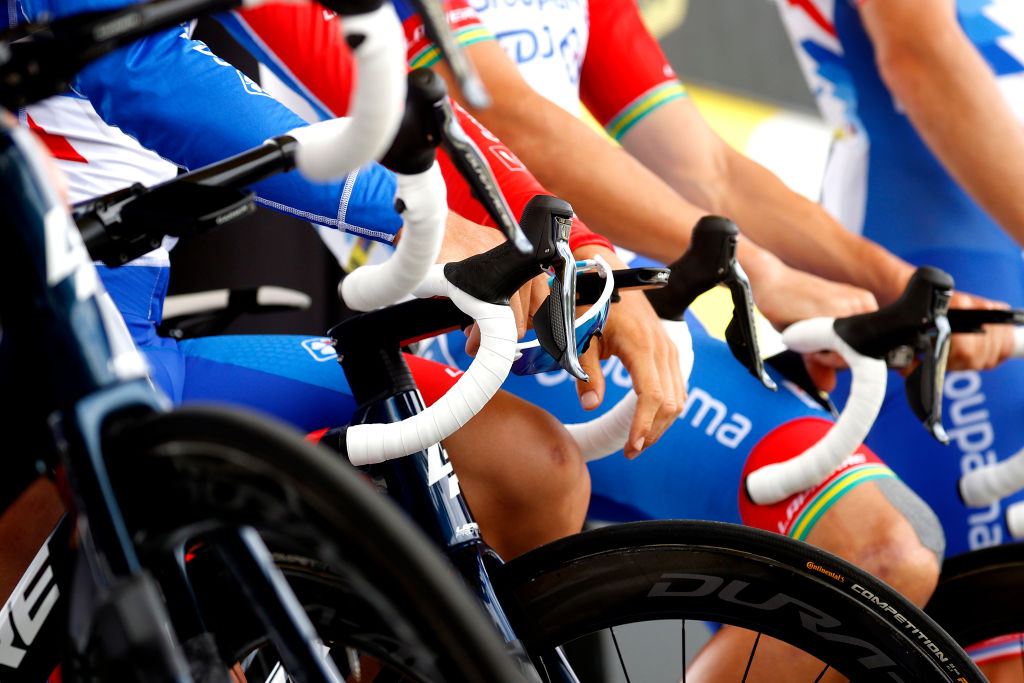Global bike and component shortages force WorldTour teams to be frugal with equipment
Some teams opt to recycle their 2021 bikes instead of selling them to the public

The global shortage of bikes and components has forced consumers to wait far longer than usual to receive their new bikes and favourite brands. Now the supply chain headaches and lack of product are also hitting some WorldTour teams, delaying the arrival of their new 2022 bikes and forcing them to be far more frugal with their 2021 equipment.
According to the French L’Equipe newspaper and other recent reports, some teams struggled to even service their bikes as they once did in the final months of the season. Despite ordering their 2022 bikes months in advance and have special access to products from their sponsors, some riders will begin their winter training for 2022 on their old bikes.
“It was difficult to end the year without problems. In the last few weeks of racing, we weren’t even able to change the wheels,” Groupama-FDJ team manager admitted to L’Equipe.
"The shortage has forced the teams to adopt a more sustainable approach," Benoît Genauzeau, the sports manager of TotalEnergies said.
“Equipment has always been precious but now it has also become scarce, we had to be even more economical.”
Bike brands pay the leading teams several million Euro per year in sponsorship but also supply around 150 frames and other numerous components to teams, while other sponsorship deals often cover wheels, saddles, cockpits, tyres and other consumables.
A men’s WorldTour team has around 30 riders, with each going through at least two or three bikes per season, with team leaders demanding and using much more.
Get The Leadout Newsletter
The latest race content, interviews, features, reviews and expert buying guides, direct to your inbox!
Race bikes that are kept at the team’s Service Course and taken to races in the mechanic’s truck. Riders also have a bike for training at home, with most riders also having a time trial bike at home.
Teams usually order their new bikes in the late summer of the previous season depending on the lead and delivery time of the brands, with a change of bike and component sponsors or a switch fron rim brakes to disc brake always complicating the process.
Team mechanics often gather at their Service Course in early December to build hundreds of new bikes in a few days. However, the shortages and supply chain problems have delayed the process and forced some teams to hold onto their 2021 bikes.
"The shortage has forced the teams to adopt a more sustainable approach," Thomas Damuseau, the head of operations at AG2R Citroën told L’Equipe.
“Before, when a derailleur was damaged, it was thrown away. Today, we keep it and repair it.”
While some teams have announced the sale of the 2021 team bikes online, others have delayed their usual fire sale, even if it costs them revenue. An unnamed WorldTour mechanic suggested to L’Equipe will have "a huge shortfall, of more than 200,000 Euros.”
"We will sell them when we have the new stock," Madiot said.
Groupama-FDJ is sponsored by Shimano, while the others are sponsored by either SRAM or Campagnolo. The Japanese brand sponsored 13 of the 19 WorldTour team in 2021.
Groupama-FDJ and Team DSM were often the first to be given new components and helped with development but according to L’Equipe Shimano decided to treat all the teams equally due to the product shortages.
Shimano has reportedly increased production after delays sparked by COVID-19 lockdown but it is struggling to respond to the growth in global bike sales. Delivery times to bike brands for sale to the public are said to be between 12 and 18 months. Teams are given special treatment but their components come from the same production lines and so have been affected.
"We are still awaiting a major delivery from Shimano: the equipment has left Asia and it is currently in the Netherlands, that's something," Madiot said.
“The frames from our French manufacturer Lapierre have arrived, so we’re not worried about being ready for the first training camp (in Calpe, Spain from December 12 to 21). But I will not be reassured until we have received everything.”
AG2R-Citroën have stuck with BMC and Campagnolo but other teams have endured a stressful winter searching for equipment supplies.
"After what we’ve been going through for a few months, many teams will question the choice of their supplier," Damuseau suggested.
Some teams are expected to use their 2021 bikes at December training camps as they wait for their 2022 equipment.
Fortunately the cancellation of the Tour Down Under has eased the pressure on teams to be race ready for early January. But 2022 looks set to be another season of being frugal and careful with equipment, even for the sport’s biggest WorldTour teams.

Stephen is one of the most experienced member of the Cyclingnews team, having reported on professional cycling since 1994. He has been Head of News at Cyclingnews since 2022, before which he held the position of European editor since 2012 and previously worked for Reuters, Shift Active Media, and CyclingWeekly, among other publications.